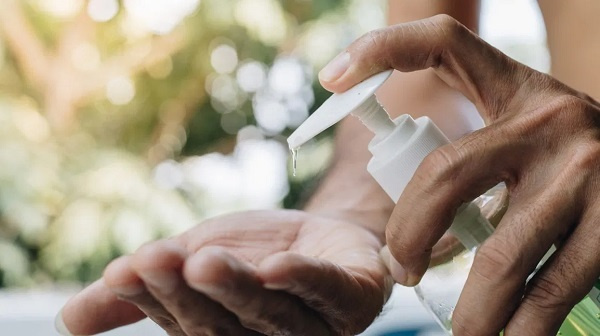Demand for hand-santisers and Veronica buckets has fallen to levels recorded prior to the announcement of the first confirmed case of COVID-19 in the country.
The mass hysteria, panic-buying and consequent price-gouging of alcohol-based hand-santisers, as well as Veronica buckets which characterised the days immediately after confirmation of the first case of coronavirus in the country, has disappeared – leading to indifference by some sections of the public.
Eight weeks after the first confirmed case and four weeks after lifting the restrictions on movement in the hotspots – Tema, Accra and Kumasi – the B&FT can confirm that current demand for hand-santisers is almost non-existent.
A pharmacist, who spoke to the B&FT a day before the first case was announced, has confirmed the veracity of the development. “We scarcely have anyone walking in to buy sanitisers these days. I can’t give you an exact figure in terms of volumes sold, but I can safely say that sales are significantly below 10 percent after the lockdown.
“Occasionally, in some of our branches which are situated in high-brow areas, we record noticeable purchases by one or two individuals: but, largely, patronage remains low,” he added without divulging his name.
He however expressed optimism that after the initial shocks are over, demand will come to a point of equilibrium; as an appreciable number of individuals and institutions will adopt some of these personal hygienic practices on a permanent basis.
For Obaa Yaa, a seller of Veronica buckets near the Korle Bu Teaching Hospital, the situation is no different. She is however of the opinion that being non-perishable goods, it is to be expected that demand for the buckets would stall beyond a certain threshold. “After all, it is not food so we can’t expect people to buy it every day. But I hope that when ban on social gatherings is lifted, institutions such as churches and schools will come to purchase more.”
A producer of hand-sanitisers with Food and Drugs Authority (FDA) approval also confirmed the slump in sales. She suggested some factors she believed were responsible for the development. “We must remember that in response to the excessive demand, much was produced; and I believe there’s excess supply in the system. Also, many people stock-piled for fear of running out, and I doubt they have exhausted their supplies,” she noted.
Novel no more?
Interacting with a fish vendor at the Central Business District, hand-sanitisers are the opportunity cost for purchasing face masks. “Business has been slow and our children are at home, I cannot afford to buy face masks and hand-sanitisers. I have had to choose one and I believe the mask is more effective; I try to wash my hands frequently,” she said.
She added that she would gladly make use of the sanitisers if they are significantly subsidised or made available for free.
Her sentiments seem to be echoed by many who view hand-santisers as a luxury that cannot be afforded during an economic downturn, especially for a disease that was heralded as extremely deadly but seems to have devastated the nation more economically and not necessarily in terms of fatalities.
Casual observation points to a flagrant disregard for the personal hygiene protocols in many communities, with the use of masks of or hand-sanitisers increasingly becoming a rare. Reacting to this distressing development, the Minister for Health, Dr. Kwaku Agyeman-Manu, at a press conference last week made an impassioned plea for observance of these protocols.
“We need to first of all make up our minds that our way of life, the way we live is going to change, for a long time to come. So, we need to begin advising ourselves that to enable the scientists to win, we have to change our way of life.”
CHECK OUT: Can your marriage survive the coronavirus?
Source: B&FT Online

























